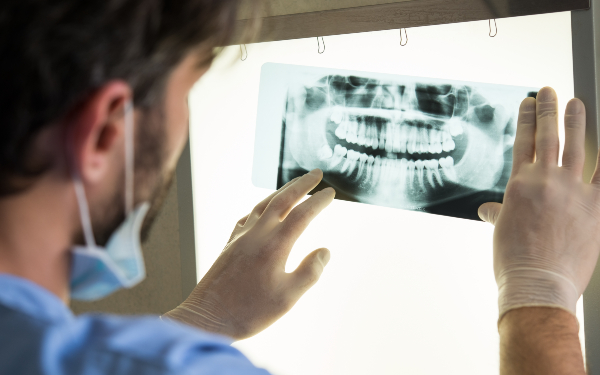
Unaccompanied asylum-seeking children would be treated as adults – and likely detained – if they refused to consent to having their age assessed using scientific methods in age-disputed cases.
Ministers successfully amended their Illegal Migration Bill this week to enable them to make regulations to classify those deemed to have entered the UK illegally who did not consent to an age check without reasonable grounds as aged 18 or over.
The change – which would tighten existing provisions casting doubt on those who refused to consent without reasonable grounds – runs counter to the advice of the government’s own scientific advisers on age assessments.
‘No automatic assumptions from consent refusal’
In a report published earlier this year, the interim Age Estimation Science Advisory Committee (AESAC) said that “no automatic assumptions or consequences should result from refusal to consent”.
Unaccompanied claimants would also lose the right to appeal to the immigration tribunal against a decision to classify them as an adult, under a separate government amendment to the bill passed on Wednesday.
The changes would apply to any unaccompanied child who met the following four conditions: they entered the UK after 7 March 2023; had no right to enter; had no right to remain, and had not come directly from a country in which their life or liberty were threatened. This would likely cover the majority of unaccompanied claimants entering the UK after that time.
Those classified as adults would not only be placed outside the scope of the care system, but would also be detained and face deportation to their home country, if safe, or to a third country, such as Rwanda.
Controversy over scientific age assessments
This week’s amendments would tighten a system, introduced in last year’s Nationality and Borders Act 2022, that was itself criticised by children’s charities and social workers as punitive and liable to result in child claimants being wrongly treated as adults.
Groups including the British Dental Association (BDA) and Royal College of Paediatrics and Child Health (RCPCH) attacked provisions to bring in scientific assessments of age, such as x-rays of teeth or bone scans, on grounds of unreliability and lack of ethics.
The government may only, through regulations, introduce scientific methods it has deemed to be appropriate, based on advice from the AESAC.
In its report published in January, the interim AESAC concluded that no one method of assessing age was infallible and it was best to combine social work with scientific assessments.
Impact of trauma
Echoing concerns articulated by charities, the committee said no automatic assumptions should be made from a refusal to consent, adding that claimants may have witnessed or experienced trauma from their homeland government and view authority with suspicion as a result.
“If the applicant decides not to undertake biological age assessment without any justification for the refusal, the application can continue utilising the existing Merton-compliant process,” it added.
However, this week’s government amendment rejects this position.
Addressing the Illegal Migration Bill’s final (third reading) debate in the House of Commons, immigration minister Robert Jenrick said there were “very real safeguarding risks posed by young adults pretending to be children”, saying that claimants were found to be adults in half of disputed cases.
However, though this figure is accurate over a longer period, last year 62% of age-disputed cases found that the claimant was a child.
In making the amendment, the government said those who refused to consent would only be treated as adults if the home secretary were satisfied that the scientific methods in question were “sufficiently accurate” such that its actions were compliant with the European Convention on Human Rights.
Policy ‘utterly ridiculous’ – SNP
But the policy was attacked by opposition politicians.
Scottish National Party home affairs spokesperson Alison Thewliss described the proposals as “utterly ridiculous” and saying they posed “a clear safeguarding risk” in leading to children placed with adults. She also cited the opposition of the BDA and RCPCH to using x-rays and scans to assess age, describing it as “pseudoscience”.
Under the amendment on appeals against age assessment decisions, claimants covered by the bill would be unable to take their case to the immigration tribunal if they were deemed to be an adult. They would be able to apply for a judicial review against the decision, but only on the grounds of unlawfulness, not on the facts of the case.
Charities have also attacked the Illegal Migration Bill for allowing the government to detain and remove unaccompanied children before they turned 18, as well as on reaching maturity.
Concessions on removing and detaining children
In a concession to critics, the government took steps to limit the circumstances in which it could take either step.
It passed two amendments would allow it to bring in time limits on the length of detention of an unaccompanied child pending their removal from the country.
Under a separate amendment, the government would only be able to remove an unaccompanied child to reunite with parents, return to a safe country of origin or for which they had a passport, or to return to such a country in the absence of a human rights claim preventing this.
However, the bill would allow ministers to make regulations setting further circumstances in which they would remove an unaccompanied child.
Jenrick said this was “futureproofing the bill against the risk that the people smugglers will seek to endanger more young lives and break up more families by loading yet more unaccompanied children on to the small boats”.
The bill as a whole was voted through by the Commons this week, by 289 votes to 230, and now passes to the House of Lords where, in the absence of a government majority, it is likely to face much stiffer opposition.




 Family help: one local authority’s experience of the model
Family help: one local authority’s experience of the model  ‘I spent the first three months listening’: how supportive leadership can transform children’s services
‘I spent the first three months listening’: how supportive leadership can transform children’s services  How senior leaders in one authority maintain a culture of excellence
How senior leaders in one authority maintain a culture of excellence  How staff support ensures fantastic outcomes for children and families
How staff support ensures fantastic outcomes for children and families  Workforce Insights – showcasing a selection of the sector’s top recruiters
Workforce Insights – showcasing a selection of the sector’s top recruiters 

 Facebook
Facebook X
X LinkedIn
LinkedIn Instagram
Instagram
This is not a task checking age to determine correct age.i worked in a London Borough and it was clear many were older than 18 yrs.
Another case a male unaccompanied minor made ir clear, that he came to the UK by boat so he his age could not be checked. Stated if coming by plane would have to use correct details. So the LA has to look after him, knowing he is an adult. What are they to do.
I think this is a good idea and makes for a more robust system which is harder to abuse. I worked with UASC back in 2010/2011 and out of a caseload of c. 25-30, there were only three that didn’t look older than me (I was in my mid to late twenties at the time).
Its ensuring the safety of the other children they may be housed with. There is no simple answer – and there needs to be responsibility taken by those seeking help too.